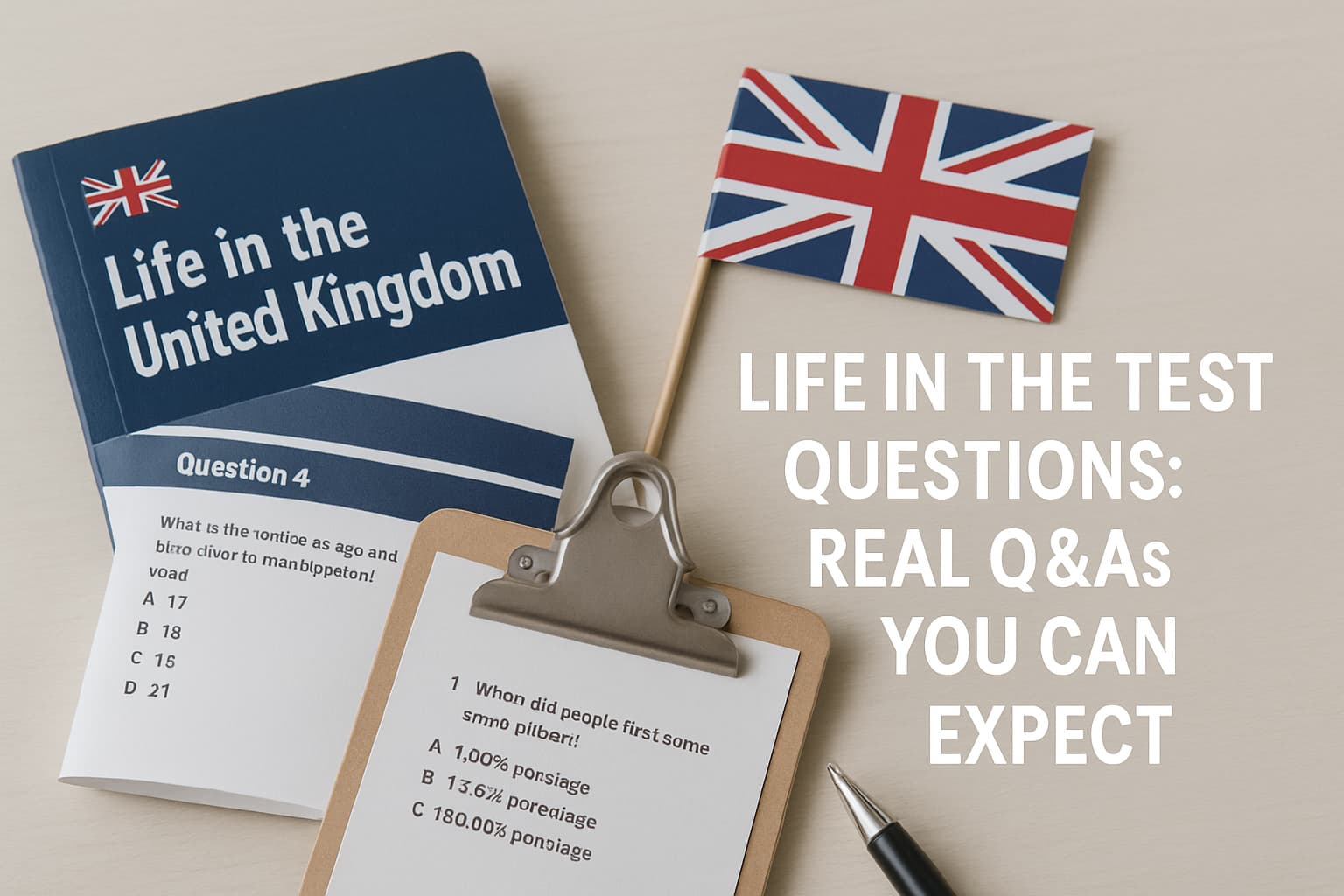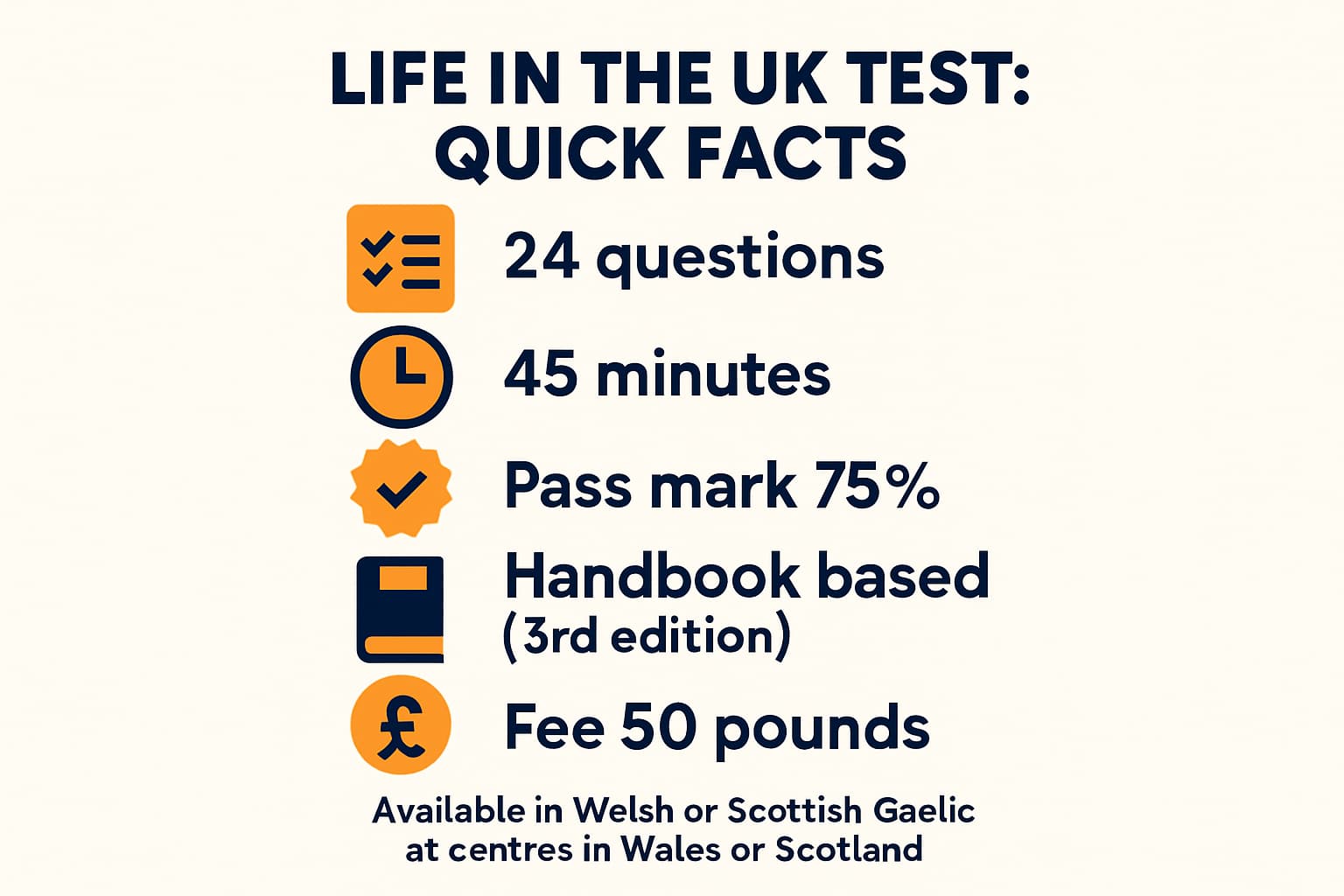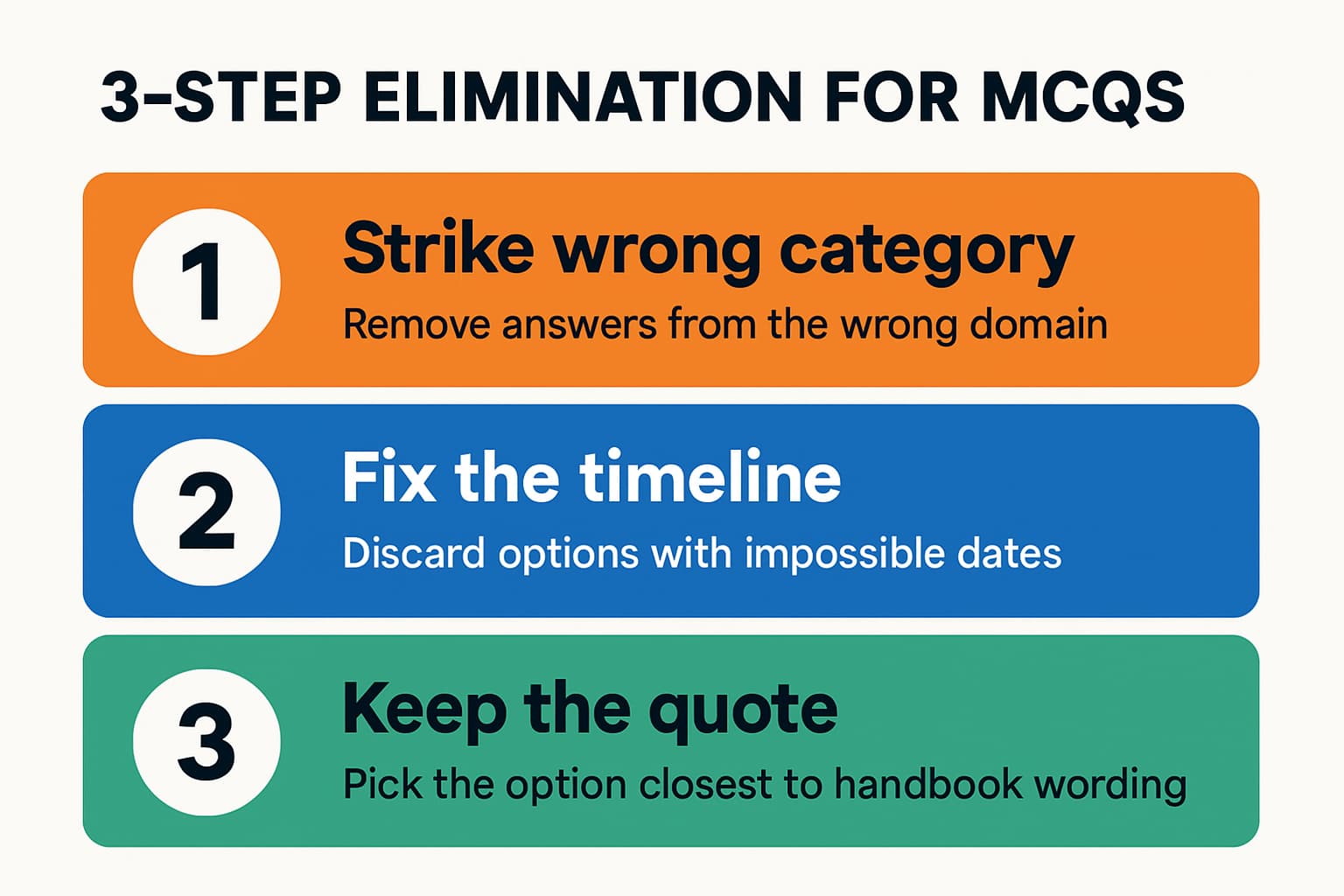Life in the UK test questions: real Q&As you can expect

Worried about what the Life in the UK test questions actually look like? Here’s a clear, realistic tour of the exact styles, topics, and wording logic you can expect in 2025.
Below you’ll see how questions are framed, the major topic areas, authentic sample Q&As aligned to the official handbook (3rd edition), and a proven method to pick the right answer. You’ll also get targeted practice tips and smart tools to avoid retests.
What the Life in the UK Test Questions Look Like in 2025
The exam has 24 multiple-choice questions, lasts 45 minutes and requires a 75% score to pass. That’s 18 or more correct answers in under an hour. The test is computer-based and administered at approved centres across the UK. Every question comes from the official handbook, Life in the United Kingdom: A Guide for New Residents (3rd edition), so your preparation should focus on that content.
Format: 24 MCQs in 45 minutes; pass mark 75% (18/24).
Content source: official 3rd edition handbook only.
Cost: £50; book online at least 3 days in advance.
Languages: English; also available in Welsh (in Wales) and Scottish Gaelic (in Scotland).
When you pass: you receive a unique reference number to complete your ILR or citizenship application.
See details on booking, timing and pass mark at GOV.UK and specialist immigration resources.

Question Style and Structure
Most items are single-best-answer multiple choice: one stem followed by 3–4 options. Questions balance recall (names, dates, institutions) with understanding (roles, responsibilities, cause-and-effect in history). Some tests may include multi-select items, so read stems carefully for phrases like “Select two.”
Expect clear wording with precise facts from the handbook.
Look for cues like “most accurately,” “main role,” or “is not,” which change what is correct.
Distractors often contain near-true facts from the same topic area.
What the Answers Require
Correct answers hinge on accurate names, dates, functions and responsibilities exactly as described in the handbook. Where timelines are involved, the test expects correct sequence and century. For government questions, roles must match the correct institution (e.g., what Parliament does versus what the devolved legislatures do). For culture and traditions, expect canonical facts: national days, symbols, and famous works.
The Major Topic Areas (with realistic examples)
Here’s how the handbook’s core domains commonly turn into questions. The prompts below mirror the official style without going off-syllabus.
UK Values, Responsibilities, and Everyday Life
Responsibilities of residents: obeying the law, paying taxes, respecting others, and taking responsibility for your family.
Values in public life: democracy, the rule of law, individual liberty, mutual respect and tolerance.
Community engagement: volunteering and local participation.
Everyday norms: schooling, healthcare basics, and work culture.
Realistic prompt example: “Which of the following is a responsibility of every resident in the UK?”
Government, Law, and Institutions
Parliament, Prime Minister and Cabinet; how laws are made.
Elections and accountability; who can vote and how MPs are chosen.
Devolved powers in Scotland, Wales and Northern Ireland.
Court system: magistrates’ and Crown Court, civil courts, the Supreme Court.
Realistic prompt example: “Which body is responsible for making laws in the UK?”
History Timeline and Turning Points
From early settlers to the Normans, Tudors, the Civil War, the Union, industrialisation, the world wars and modern Britain.
Key documents and events: Magna Carta, the Bill of Rights, Acts of Union, the NHS.
Realistic prompt example: “In which year did the Battle of Hastings take place?”
Culture, Landmarks, and Traditions
National days, flags and emblems; patron saints.
Famous writers, scientists, artists and their works.
Sporting traditions and major events.
Geography and iconic sites across the four nations.
Realistic prompt example: “Which flower is associated with Wales?”
Nations and Devolution (England, Scotland, Wales, NI)
Distinct identities and capitals; devolved institutions.
What each administration can legislate on (e.g., education and health are devolved in Scotland, Wales and Northern Ireland).
Realistic prompt example: “Where does the Scottish Parliament sit?”
Realistic Sample Q&As by Topic (aligned to the handbook)
Practice with exam-style wording. These examples reflect the handbook’s scope and typical distractors. Choose the single best answer unless the stem says otherwise.
UK Today and Society
Which of the following is a core value supported by UK public life?
A. Compulsory voting
B. Mutual respect and tolerance
C. State-controlled media
D. Military rule
Answer: B. The handbook highlights democracy, rule of law, individual liberty, mutual respect and tolerance.
Which is a legal responsibility of everyone living in the UK?
A. Join a political party
B. Obey the law
C. Serve on a jury every year
D. Serve in the armed forces
Answer: B. Obeying the law (and paying taxes, etc.) are explicit responsibilities.
Volunteering in your community is described as:
A. Illegal without a licence
B. A normal and valued part of life
C. Required for citizenship
D. Only for students
Answer: B. The handbook encourages volunteering as part of community life.
Government and Political System
Who forms the UK government?
A. The monarch alone
B. The leader of the party with the most MPs in the House of Commons
C. The Speaker of the House of Lords
D. All regional mayors together
Answer: B. The Prime Minister leads the government; they are normally the leader of the majority party in the Commons.
Which statement is correct about Parliament?
A. It is made up of the House of Commons and the House of Lords
B. It is a single chamber elected every year
C. It meets only during elections
D. It is part of the courts
Answer: A. Parliament has two chambers: Commons and Lords.
Which policy area is commonly devolved to Scotland, Wales and Northern Ireland?
A. Foreign affairs
B. Defence
C. Education
D. Immigration
Answer: C. Education and health are examples of devolved matters.
Which court deals with the most serious criminal cases in England and Wales?
A. Magistrates’ Court
B. Crown Court
C. County Court
D. Family Court
Answer: B. Serious criminal cases go to the Crown Court.
Key Historical Eras
In which year did the Battle of Hastings occur?
A. 1215
B. 1066
C. 1314
D. 1588
Answer: B. 1066 marks the Norman Conquest.
What was the Magna Carta?
A. A 17th-century law abolishing the monarchy
B. A 13th-century charter limiting the king’s power
C. A treaty with France ending the Hundred Years’ War
D. The first UK written constitution
Answer: B. Signed in 1215, it limited royal authority and influenced later constitutional developments.
Which event is associated with 1688?
A. The Glorious Revolution
B. The Act of Union
C. The Restoration
D. The English Civil War begins
Answer: A. The Glorious Revolution established parliamentary supremacy.
What began in Britain in the 18th century and transformed manufacturing?
A. The Renaissance
B. The Industrial Revolution
C. The Enlightenment
D. The Agricultural Repeal
Answer: B. The Industrial Revolution started in Britain and changed industry and society.
Which year saw the founding of the NHS?
A. 1939
B. 1948
C. 1953
D. 1969
Answer: B. The National Health Service was founded in 1948.
Culture and Celebrations
Which flower is traditionally associated with Wales?
A. Rose
B. Thistle
C. Daffodil
D. Shamrock
Answer: C. Wales is associated with the daffodil (and the leek).
Who wrote Romeo and Juliet?
A. William Shakespeare
B. Charles Dickens
C. Jane Austen
D. Geoffrey Chaucer
Answer: A. Shakespeare is a key cultural figure in the handbook.
Which day is celebrated as St Andrew’s Day?
A. 1 March
B. 17 March
C. 23 April
D. 30 November
Answer: D. 30 November is St Andrew’s Day (Scotland).
How to Read MCQs and Choose the Right Answer
Use this quick method to decode stems and avoid traps. It aligns with how citizenship test UK questions are written.
Pin the topic: Identify if it is about a value, an institution, a date, or a person. That limits what can be true.
Underline qualifiers: Words like “main,” “only,” “always,” or “except” change the target. Beware absolutes.
Match the handbook wording: If one option echoes the handbook’s phrasing, it is often correct.
Eliminate near-misses: Remove options with wrong dates, wrong roles or mixed institutions.
Verify quickly: On tough questions, ask: “Is this exactly what the handbook says?” If not, skip and return.
Timeframes, Absolutes, and Traps
Close dates: 1065 vs 1066; 1945 vs 1948. The test loves near misses—anchor each event to a century and a memorable cue.
Mixed institutions: Confusing Parliament with government, or UK-wide powers with devolved powers.
Absolutes: Options using “always,” “only,” or “all” are often wrong unless the handbook is explicit.
Negatives: “Which is not...” requires you to spot the odd one out—read twice before selecting.
Elimination and Verification
Try this 3-step elimination strategy in practice and on exam day.
Strike wrong category: Remove answers from the wrong domain (e.g., foreign policy for a devolved-education question).
Fix the timeline: Remove any options that cannot fit the sequence you know (e.g., NHS before WWII).
Keep the quote: Choose the option that best matches the handbook’s phrase or definition.

Practice Smarter with the Life in the UK Test App
If you are overwhelmed by the handbook, targeted practice makes the difference. The Life in the UK Test App turns the exam’s style into 650+ realistic questions with clear explanations, so you remember exactly what the test expects.
Realistic coverage: Questions mirror the handbook’s facts and phrasing logic, including trick dates and commonly confused roles.
Mock tests and Hard Mode: Simulate timing and harder distractors to build exam resilience.
Readiness score: Track when you are consistently hitting 80–90% so you can book confidently.
Offline access: Study in short sessions anywhere without losing progress.
Prefer a quick strategy guide before diving in? Read our practical overview in Ace the Life in the UK Test Questions | Practice Tips 2025.
Brit-Bear Learning Assistant
Brit-Bear guides your prep like a personal tutor:
Hints on demand: Get short nudges that point to the right principle without giving the answer away.
Weak-topic targeting: The app surfaces your lowest-performing topics (e.g., timeline dates) for focused review.
Spaced review: Cards you got wrong return at the right time so they stick before test day.
Download and Start Now
Start practicing realistic life in the uk test question and answer sets today:
Download on App Store: https://apps.apple.com/app/id6743702124
Get it on Google Play: https://play.google.com/store/apps/details?id=net.briceventures.life_in_the_uk_test
For deeper tactics on question interpretation, see 7 Expert Tips: Ace UK Citizenship Test Questions and Answers.
Common Mistakes that Lead to Wrong Answers
Mixing UK-wide vs devolved powers: Remember education and health are devolved; defence and foreign affairs are reserved to the UK government.
Misreading dates: Swapping 1215 (Magna Carta) and 1689 (Bill of Rights), or 1939 vs 1948.
Confusing institutions: Parliament (makes laws) versus government (runs the country); the courts interpret and apply the law.
Overthinking culture items: Stick to canonical associations: rose (England), thistle (Scotland), daffodil/leek (Wales), shamrock (Northern Ireland).
Ignoring multi-select cues: Some questions require more than one correct answer—look for “Select two.”
Before exam day, skim our quick pitfall list in 7 Common Life in the UK Test Mistakes to Avoid.
Quick Revision Checklist
Use this on the morning of your test for a last, high-yield sweep.
Know the pass mechanics: 24 questions, 45 minutes, 75% pass. Bring the same original ID you used to book.
Anchor timeline tentpoles: 1066, 1215, 1688/1689, 1707, 1801, 1914, 1939, 1948.
Fix roles: Parliament vs government, devolved vs reserved powers, Crown vs PM.
Symbols and days: Flags, flowers, and patron saints’ days for each nation.
Scan devolved institutions: Names, locations, and general areas of responsibility.
MCQ routine: Read the stem twice, mark qualifiers, eliminate, verify with handbook phrasing.
For focused practice on the tough bits, try our guide to the most challenging Life in the UK test topics and these effective practice strategies.
FAQs: What to Expect from Questions and Answers
What is the format and pass mark? 24 computer-based MCQs in 45 minutes; you need 75% to pass. Questions are drawn from the official handbook.
Are questions single- or multiple-answer? Most are single best answer. Some versions indicate multi-select items—read stems carefully for “Select two.”
Can I take the test in Welsh or Scottish Gaelic? Yes. Welsh is available at test centres in Wales; Scottish Gaelic in Scotland.
How do I book and what does it cost? Book online, at least 3 days in advance. The fee is £50.
What happens after I pass? You receive a unique reference number to use in your settlement or citizenship application.
Important official details and context
The Life in the UK test is a statutory part of the Knowledge of Language and Life in the UK requirement and has been in place since 2005 (citizenship) and 2007 (settlement). Centres operate across the UK, with special arrangements for some armed forces personnel abroad. Policy debates continue around eligibility timelines and language standards, but the test format remains multiple choice based on the 3rd edition handbook.
Ready to practice the real thing?
Turn the patterns above into confidence with the Life in the UK Test App. Work through realistic mock tests, get instant explanations, and watch your readiness score rise. When you are consistently over 80–90% in timed mocks, book your test.
Download on App Store: https://apps.apple.com/app/id6743702124
Get it on Google Play: https://play.google.com/store/apps/details?id=net.briceventures.life_in_the_uk_test
References and further reading: Book, timing and pass rules at GOV.UK. Background on content and scope in this overview of the test. Booking and costs at GOV.UK Life in the UK test. Context on test centres and pass requirement from Paragon Law. Test administration and language availability in the Home Office PSI guidance Knowledge of language and life in UK. Broader policy context reported by The Independent. English language (B1) requirement explained by DavidsonMorris.